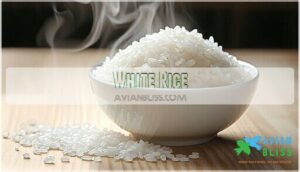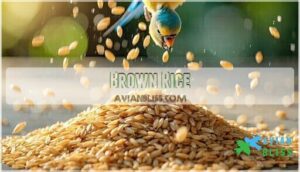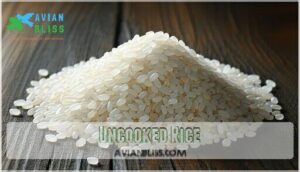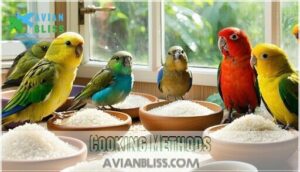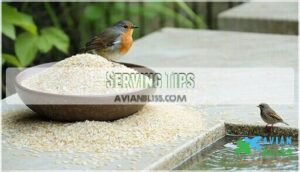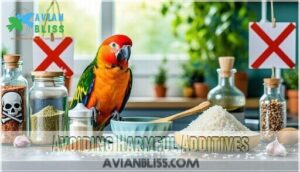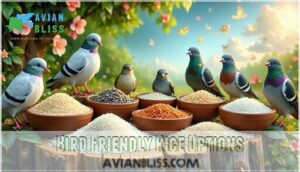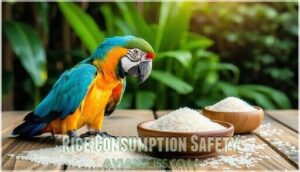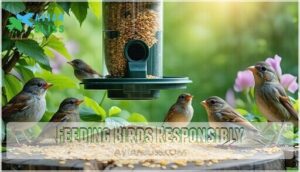This site is supported by our readers. We may earn a commission, at no cost to you, if you purchase through links.
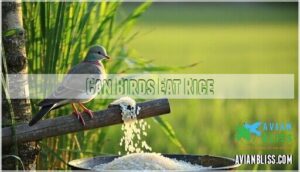
Whether it’s white, brown, or even uncooked rice, most birds can digest it without any trouble—no, it won’t make their stomachs explode (that’s just an old myth).
Rice provides energy and essential nutrients, making it a great occasional treat.
However, avoid seasoning or adding oils, as these can harm your feathered friends.
Think of rice as a side dish, not the main course, since a balanced diet is key for their health.
Curious about the best types of rice or how to prepare it? Stay tuned!
Table Of Contents
Key Takeaways
- Birds can safely eat rice, whether it’s white, brown, or uncooked, as their digestive systems handle it efficiently.
- Avoid seasoning or adding oils to rice since these can harm birds; stick to plain, unseasoned options.
- Rice offers energy and some nutrients but shouldn’t replace a balanced diet with seeds, fruits, and other essentials.
- The myth that rice harms birds by expanding in their stomachs is false; it’s perfectly safe in moderation.
Birds Eating Rice
You’ve probably wondered whether it’s safe to toss rice at weddings or sprinkle some in your backyard for feathered friends, and the answer might surprise you.
Despite widespread myths claiming rice expands dangerously in birds’ stomachs, scientific evidence shows that birds can safely digest both cooked and uncooked rice without any harmful effects.
Birds can safely enjoy rice, debunking the myth that it dangerously expands in their stomachs.
Avian Digestion Process
Your bird’s digestive system works like a well-oiled machine.
Food travels from the crop through the proventriculus, where digestive enzymes begin breaking it down.
The gizzard then acts as nature’s food processor, grinding rice into tiny pieces with help from ingested grit.
This gizzard function guarantees efficient rice breakdown, while crop capacity allows birds to store food temporarily before digestion begins, ensuring an efficient process like a food processor.
Rice as Bird Food
Despite widespread misconceptions, rice palatability makes it an excellent bird feeding option.
Rice digestion occurs naturally in wild birds who’ve consumed various rice varieties for centuries.
Whether you’re considering cooked rice birds can safely eat or wondering "is rice safe" in its uncooked form, proper rice preparation guarantees uncooked rice birds encounter poses no danger.
Rice safety stems from birds’ robust digestive systems handling rice for birds effectively.
Nutritional Value of Rice
Rice composition offers impressive nutritional value for your feathered friends.
This grain delivers substantial energy content through carbohydrates, while vitamin presence includes thiamine and niacin for nervous system health.
You’ll find mineral density provides iron for vibrant plumage and magnesium for bone strength.
Consider these rice nutrition benefits:
- Energy boost – Carbs fuel active flight and foraging
- Feather brilliance – Iron enhances natural color pigments
- Strong bones – Essential minerals support skeletal health
Can Birds Eat Rice
Yes, birds eat rice safely! The rice myth claiming uncooked grains explode in bird stomachs is completely false.
Many bird species naturally consume rice in wild bird diet patterns, from waterfowl in paddies to backyard visitors like doves and sparrows.
You don’t need to worry about what birds eat when rice is involved. Proper rice preparation and bird feeding practices make rice a suitable food source, though it shouldn’t replace nutritionally complete options.
Safe alternatives exist, but rice won’t cause nutritional deficiencies when offered occasionally.
Rice Benefits for Birds
You’ll discover that rice offers your feathered friends valuable nutritional benefits, including essential carbohydrates for quick energy and important vitamins like thiamine that support their nervous system health.
Rice provides birds with quick energy and vital nutrients like thiamine, supporting their active lives and nervous system health.
Rice also provides protein and iron that help maintain vibrant feather colors and overall bird wellness, making it a surprisingly useful addition to their diet when offered properly, supporting their overall wellness.
Energy Source
When you’re feeding your feathered friends, rice acts like premium fuel for their busy lives.
The carb breakdown process transforms rice calories into sustained energy that powers flight, foraging, and daily activities.
This metabolic process efficiently converts carbohydrates into usable fuel, while energy storage mechanisms help birds maintain stamina. Including rice in bird nutrition plans provides the high-octane boost these active creatures need.
Nutrient Rich Food
Beyond basic energy, rice offers limited essential bird nutrients compared to specialized feeds.
While brown rice contains more vitamins and minerals than white varieties, it can’t provide a balanced bird diet alone.
Consider these nutritional gaps:
- Protein deficiency – Rice lacks adequate amino acids for growth
- Vitamin shortfalls – Missing essential A, D, and K vitamins
- Mineral imbalances – Insufficient calcium and phosphorus levels
Alternative bird foods deliver superior rice nutrient density.
Healthy Plumage
Several nutrients in rice directly support your bird’s stunning plumage through enhanced feather pigmentation and protein intake.
Iron boosts vibrant colors while thiamine promotes healthy molting impact cycles.
The carbohydrates provide energy for preening, helping distribute oils from the uropygial gland for natural feather sheen.
This nutritious bird food supports overall bird health, contributing to lustrous bird plumage that’ll make your feathered friend absolutely radiant.
For ideal feather health, consider supplementing their diet with foods rich in omega-3 fatty acids.
Types of Rice for Birds
You’ll find that birds can safely eat white rice, brown rice, and even uncooked rice varieties without the digestive problems many people worry about.
Different rice types offer varying nutritional benefits, with brown rice providing more complex carbohydrates and nutrients than processed white rice, though both serve as excellent energy sources for your feathered friends.
White Rice
White rice represents the most processed option among refined grains, offering birds eat rice enthusiasts a readily available choice.
While birds can safely consume cooked rice, this variety delivers primarily empty calories with minimal rice nutritional value.
The processing effects strip away beneficial nutrients, making it less ideal for your bird diet, as it provides primarily carbohydrates for energy through sources like a source of carbohydrates.
Most species show strong bird preferences for this easily digestible option, though its dietary impact remains limited nutritionally. However, it’s important to remember that rice is a readily available choice.
Brown Rice
Brown rice benefits your feathered friends more than its white counterpart.
With 82 calories per serving and higher fiber content, it’s nutritionally superior for bird diet needs.
This whole grain provides better rice nutritional value, supporting healthy digestion.
Most wild bird preference leans toward brown varieties due to natural foraging habits.
When birds eat rice, brown rice offers sustained energy and essential nutrients for peak health, making it a great choice for their diet, with higher fiber content.
Uncooked Rice
Despite widespread myth debunking efforts, many still fear uncooked rice harms birds.
Your feathered friends can safely digest raw rice varieties through their powerful avian gizzard, which grinds tough grains efficiently.
Unlike processed foods, uncooked rice doesn’t expand dangerously during avian digestion.
While it lacks the nutritional density of natural diets, birds eat rice regularly in wild settings without issue, making it acceptable for occasional feeding, particularly as an occasional treat.
Preparing Rice for Birds
When you’re ready to offer rice to your feathered friends, proper preparation guarantees they’ll get maximum nutrition while staying safe from harmful additives.
You’ll want to cook plain rice without salt, oil, or spices, then let it cool completely before serving it in shallow dishes or scattered on flat surfaces, which ensures maximum nutrition.
Cooking Methods
Now that you’ve chosen the right rice type, preparing it properly makes all the difference for your feathered friends.
You’ve got several cooking options that’ll keep your birds happy and healthy.
Here are five foolproof methods to prepare rice safely:
- Boiling – Simmer rice in plain water until tender, then drain completely
- Steaming – Cook rice above boiling water for fluffy, separate grains
- Microwaving – Quick option using water and microwave-safe containers
- Baking – Oven method that prevents sticking and burning
- Raw rice – Skip cooking entirely since birds digest uncooked grains naturally
Consider using a microwave rice cooker for convenient preparation.
Serving Tips
Once you’ve cooked the rice properly, smart presentation matters for successful bird feeding.
Spread small portions on flat surfaces or shallow dishes to prevent spoilage. Always guarantee fresh water availability nearby, as rice can be dry.
Consider mixing foods with seeds for nutritional balance. Many bird enthusiasts find success using convenient feeding solutions. Make seasonal adjustments during winter when birds need extra energy for warmth.
| Serving Method | Best For | Key Benefit |
|---|---|---|
| Flat ground scatter | Large birds like doves | Natural foraging behavior |
| Shallow dish | Small songbirds | Easy access and cleanliness |
| Mixed with seeds | All bird types | Balanced nutrition intake |
| Small portions | Preventing waste | Reduces mold and spoilage |
| Fresh daily servings | Health conscious feeding | Maintains food safety standards |
Smart bird feeding tips include offering safe amounts – typically one tablespoon per bird. Your feathered friends deserve bird food best practices that mirror their natural eating patterns, making mealtimes feel like home.
Avoiding Harmful Additives
When preparing rice for your feathered friends, you’ll want to avoid these dangerous additives that can harm their delicate systems:
- Salt dangers – Even small amounts can cause dehydration and kidney problems
- Spice concerns – Garlic and onion powders are toxic to birds
- Oil risks – Added fats can upset their digestive balance
- Artificial flavors – Chemical preservatives and colors cause serious health issues
It’s also important to avoid ingredients that contain excess omega-6 fatty acids, which can lead to inflammatory diseases.
Always choose plain, unseasoned rice for safe bird food. A balanced diet should also include essential vitamins and minerals for ideal health.
Bird Friendly Rice Options
When you’re choosing rice for your feathered friends, you’ll find that long grain, short grain, and wild rice varieties all provide safe, nutritious options that birds can digest without any stomach-swelling concerns.
Whether you pick brown rice for its extra nutrients or stick with white rice for convenience, both cooked and uncooked forms work perfectly fine.
Though larger birds like doves and pigeons handle dry grains better than smaller species, they all can benefit from the nutritional value of rice, making it a great choice with minimal concerns.
Long Grain Rice
Long grain rice works perfectly for larger birds like doves and pigeons.
The grain length makes it easier for bigger beaks to handle, while cooking time remains standard at 15-20 minutes.
Bird size matters when choosing rice types – larger species digest long grain varieties more efficiently than smaller finches.
This widely available bird food option provides excellent digestibility and fits naturally into most bird diets, making it a great choice for larger birds.
Short Grain Rice
Short grain rice offers excellent digestibility factors for smaller birds due to its compact grain size.
Finches, sparrows, and canaries show strong bird preference for this rice variety over longer types.
When considering birds eat rice options, short grain provides superior nutritional comparison benefits.
This bird diet staple breaks down easier in tiny beaks, making different types of rice accessible to species that struggle with larger grains, providing a clear benefit.
Wild Rice
Wild rice stands apart from other types of rice as nature’s premium offering for our feathered friends.
This nutrient-dense grain grows in shallow wetlands where waterfowl naturally forage, making it an ideal addition to bird diets.
Here’s what makes wild rice special for birds:
- Superior wild rice nutrition – packed with protein, fiber, and essential minerals
- Natural wild rice habitats support diverse bird populations year-round
- No cooking wild rice required – birds can safely consume it raw
- Wild rice benefits include sustained energy for migration and breeding
- Harvesting wild rice creates important feeding grounds for countless species
For ideal bird health, consider high quality seeds.
Rice Consumption Safety
You’ll want to understand the potential risks before adding rice to your bird’s diet, even though it’s generally safe for most species.
While rice won’t cause the stomach explosions described in popular myths, overconsumption can lead to digestive upset and nutritional imbalances that affect your feathered friend’s health, particularly causing digestive upset.
Digestive Issues
What happens when rice meets your bird’s digestive system?
Despite concerns about rice impaction and crop issues, birds handle rice remarkably well.
Their gizzard function efficiently grinds grains, while proper acidity levels and toxin neutralization occur naturally.
The bird digestive process prevents crop impaction through rapid food movement.
However, monitor for sour crop if feeding large quantities, as their digestive system works best with moderation.
Allergic Reactions
While rice allergies in birds are exceptionally rare, bird sensitivity can occasionally occur.
Watch for allergic symptoms like scaly skin, red eyes, or respiratory issues when introducing rice to bird diets.
These rare reactions aren’t well-documented, but identifying allergens early helps keep your feathered friend healthy.
Don’t let bird misconceptions and bird myths scare you away from offering rice as bird food, and remember the importance of monitoring for allergic symptoms.
Overconsumption Risks
Even healthy foods can become problematic when birds overindulge.
Overconsumption of rice creates several health risks that you’ll want to avoid:
- Digestive upset – Too much rice can cause digestive problems and uncomfortable bloating
- Nutritional imbalance – Rice dependency risks lead to nutritional deficiencies from missing essential nutrients
- Breeding impact – Chick feeding suffers when parents rely heavily on rice instead of protein-rich foods
Alternatives to Rice
While rice offers solid nutrition for your feathered friends, you’ll find several alternatives that provide even better dietary benefits for backyard birds.
Species-appropriate birdseed blends, nutrient-dense millet, and fresh fruits deliver superior protein content and essential vitamins that support healthy plumage and resilient immune systems.
Birdseed
Quality birdseed offers superior nutrition compared to rice alone.
Seed types like sunflower seeds, nyjer, and safflower provide essential fats and proteins your feathered friends need.
Different feeder types accommodate various bird diets and preferences.
Proper seed storage prevents spoilage while wild birdseed blends attract diverse species.
Consider buying quality birdseed for maximum nutrition.
Bird food varieties guarantee balanced nutrition, making birdseed a smarter choice than relying solely on rice for bird feeding.
Millet
Most bird enthusiasts consider millet the gold standard of bird feeding alternatives to rice.
This tiny seed packs incredible nutritional benefits that surpass many commercial bird food options.
Here’s why millet varieties excel in bird diets:
- Superior protein content – Essential amino acids support healthy feather development
- Easy digestion – Small size perfect for delicate beaks
- Natural foraging behavior – Encourages instinctive feeding patterns
Fresh Fruits
Beyond the misconceptions about whether birds eat rice, fresh fruits offer excellent nutritional value as feeding alternatives.
Apples, berries, and melons provide essential vitamins, but remove toxic fruit seeds first.
Follow proper fruit preparation methods by washing thoroughly and cutting into appropriate sizes.
Maintain safe fruit feeding frequency—offer small portions twice weekly. Always consult a safe fruit list, avoiding grapes and avocados completely.
Wedding Rice Traditions
You’ve probably heard guests at weddings toss rice to celebrate newlyweds, but you might wonder if this tradition harms the birds that clean up afterward.
The good news is that rice throwing won’t hurt our feathered friends, though many couples now choose eco-friendly alternatives like flower petals or birdseed to support local wildlife while maintaining this meaningful celebration.
Rice Throwing Safety
Throwing rice at weddings might seem harmless, but it’s often discouraged—not because of the Rice Myth, but due to safety hazards.
Rice can make walkways slippery, posing a risk for guests in fancy shoes.
Plus, leftover rice may attract pests or be labeled as litter.
While birds eat rice safely, wedding traditions now lean toward bird welfare and Wedding Alternatives like Eco-Confetti to avoid these issues.
Eco Friendly Alternatives
Considering ecofriendly alternatives for wedding tosses can make your celebration both memorable and kind to nature.
Seed paper, which grows into plants, or biodegradable confetti, offers a fun, guilt-free option.
Bubbles create a magical vibe, while ribbon wands are reusable and festive.
For a romantic touch, opt for flower petals or rose petals.
These alternative wedding toss ideas guarantee a stunning sendoff without harming wildlife or the environment!
Bird Conservation
While eco-friendly wedding traditions protect nature, they also support bird conservation.
Habitat loss, climate change, and pesticide use already threaten bird populations.
Tossing rice won’t harm birds, but invasive species and disrupted bird migration patterns add to their struggles.
By embracing bird conservation practices, like choosing native plants or bird-safe decorations, you’re helping reduce bird population threats while celebrating responsibly.
Small changes can make a big impact!
Feeding Birds Responsibly
Feeding birds responsibly means offering them a variety of safe, nutritious foods in appropriate amounts. You’ll help keep their diets balanced while avoiding items that could harm their health.
Moderation is Key
When feeding birds rice, moderation is key to maintaining healthy habits.
Overloading their diet with rice can lead to imbalances in their nutritional needs. Stick to balanced portions and offer rice as part of a varied diet.
Here’s a quick guide:
- Serve rice in limited amounts to avoid dependency.
- Pair rice with supplement options like seeds or fruits.
- Monitor your bird’s dietary needs regularly to ensure a healthy diet.
Balanced Diet
How do you guarantee your feathered friends thrive?
A balanced diet is key!
Birds need nutrient variety to meet their dietary needs.
Combine seed diversity with insect inclusion and fruit supplements for a well-rounded meal.
It’s like a buffet designed to bird food key nutrients!
Think of it as creating a bird food balanced diet that mimics nature.
Variety keeps them healthy and chirping happily.
Avoiding Harmful Foods
Not all foods are bird-friendly, so knowing what to avoid is key for bird safety.
Harmful foods can disrupt digestion or even cause bird poisoning.
Steer clear of these:
- Toxic foods like avocado, chocolate, and caffeine.
- Processed foods such as salty snacks or sugary treats.
- Moldy food, which can block digestion and sicken birds.
Stick to fresh, natural options to keep your feathered friends healthy!
Frequently Asked Questions (FAQs)
Can birds eat uncooked rice?
Imagine a bird’s stomach as a well-oiled machine—it can handle uncooked rice just fine.
Birds’ gizzards grind rice efficiently, and it doesn’t swell dangerously.
So yes, uncooked rice is safe for birds to eat.
Is rice good for birds?
Rice can be a decent snack for birds, offering energy-packed carbs and some nutrients.
Brown rice is better than white for its richer nutrition.
Just keep it plain—no salt, spices, or fancy seasonings!
Can birds eat white rice?
Picture a sparrow pecking at scattered grains—yes, birds can eat white rice.
It’s safe and provides energy, but stick to plain, uncooked, or cooked rice without salt or spices for their feathered health, focusing on plain rice for optimal safety.
Can birds eat rice at weddings?
Yes, birds can safely eat rice at weddings.
The myth about rice harming birds is debunked—avian digestion is strong enough to handle it.
Toss away, but maybe skip the flavored varieties for their sake!
Does rice kill birds?
No, rice doesn’t kill birds.
Their strong digestive systems, including gizzards, easily handle uncooked rice without harmful swelling.
The myth of rice causing bird deaths is unfounded, so feel free to toss it at weddings!
Can baby birds eat rice?
Baby birds shouldn’t eat rice because it lacks the protein and nutrients they need for growth.
Their diet should focus on soft, high-protein foods like insects or specialized formulas to support their delicate development.
Is white rice ok for birds?
White rice works wonderfully as a safe snack for birds.
It’s plain, provides quick energy, and won’t expand in their stomachs.
Just skip the salt and spices—birds prefer their meals simple and stress-free.
What animal can’t eat rice?
Most animals can eat rice, but strict carnivores like cats shouldn’t rely on it.
Their bodies lack the enzymes to process carbs effectively, making rice an occasional treat rather than a dietary staple.
Why can’t you throw rice at weddings?
You’ve probably heard it’s banned because rice harms birds, but that’s a myth.
The real reason is slippery floors and cleanup headaches.
Plus, alternatives like bubbles or flower petals are just more practical and festive.
Can squirrels eat rice?
Did you know squirrels eat up to 100 pounds of food annually?
Rice is safe for them in small amounts, but it’s not very nutritious.
Stick to nuts, seeds, and fruits for healthier options!
Conclusion
Like a well-balanced meal, rice can be a safe and nutritious treat for birds when served correctly.
Yes, birds can eat rice—whether white, brown, or uncooked—but moderation is key.
Stick to plain rice without seasoning or oils, and pair it with other foods to guarantee a balanced diet.
While rice provides energy and essential nutrients, overfeeding can lead to health issues.
So, offer rice sparingly, and your feathered friends will thrive with variety and care.
- https://www.jacksonville.com/story/news/reason/2016/10/19/fact-check-birds-really-can-eat-rice-safely/15728451007/
- https://avianreport.com/fine-feed-birds-uncooked-rice/
- https://www.facebook.com/ACSReactions/videos/fact-or-fiction-uncooked-rice-is-bad-for-birds/1245938282212986/
- http://www.sciencealert.com/news/20111909-22630.html
- https://animaldiversity.org/site/accounts/information/Dolichonyx_oryzivorus.html


